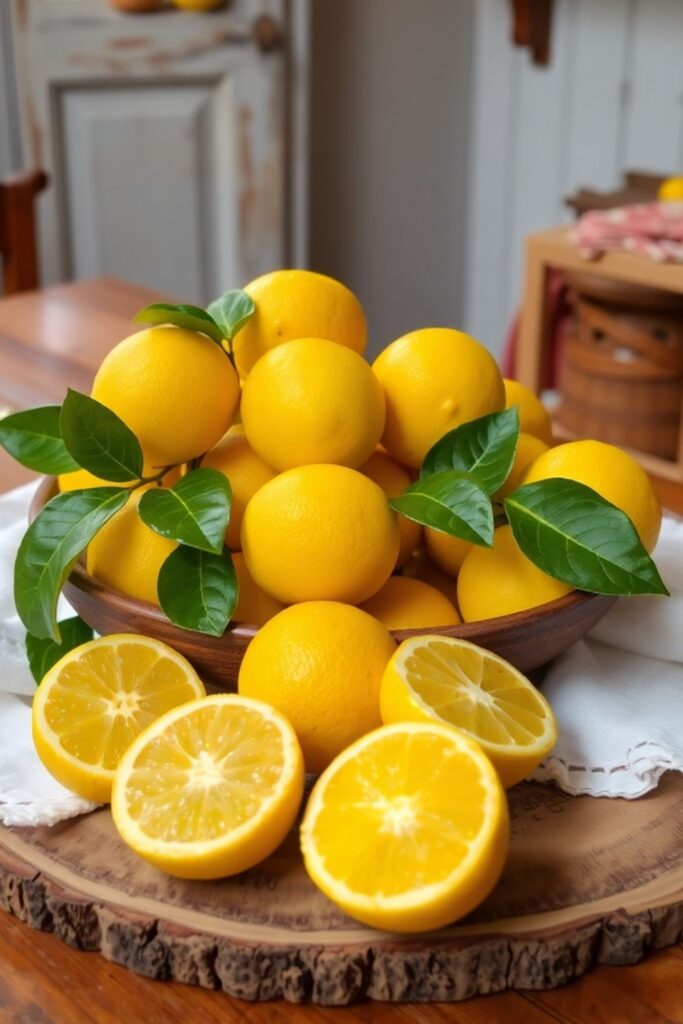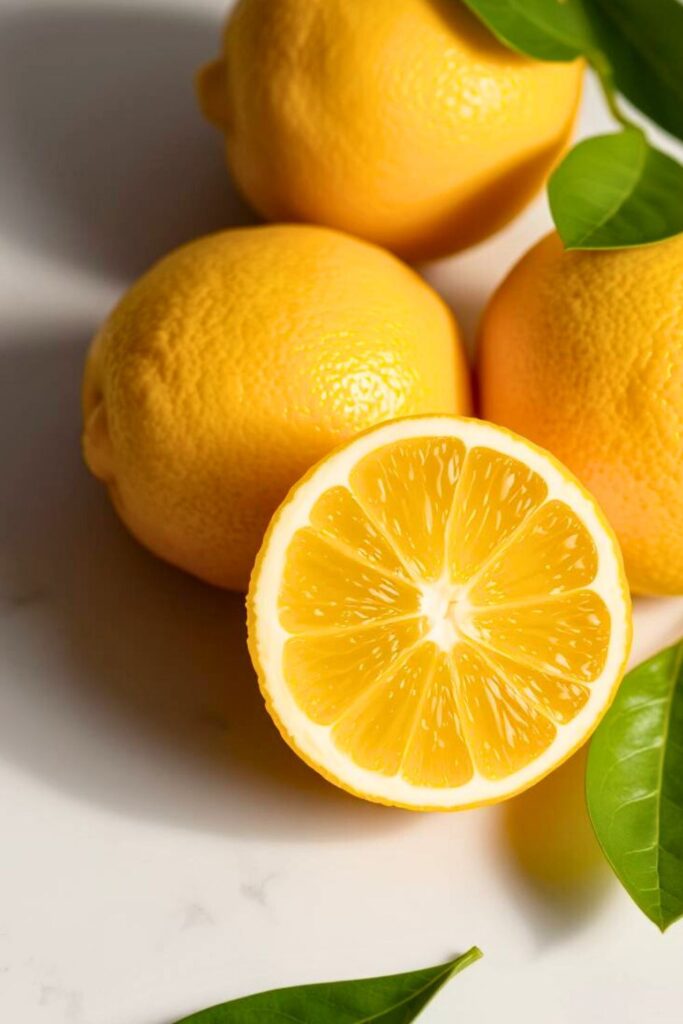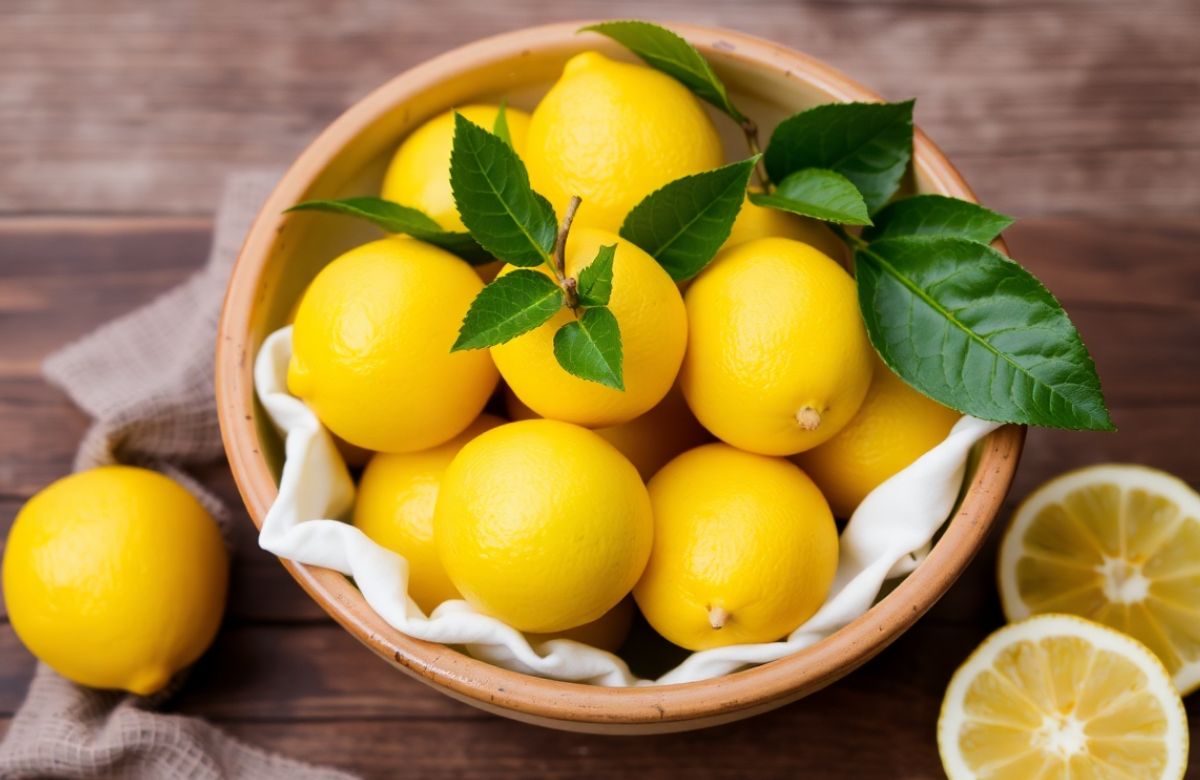Ever been mid recipe, heart set on lemon chicken or key lime pie, only to discover your citrus drawer embarrassingly empty? I’ve been there more times than I’d care to admit once while preparing dinner for a Michelin starred chef, no less. Panic mode activated! But that night taught me something invaluable: knowing your Substitutes for Lemon Juice isn’t just a convenience; it’s culinary insurance.
Lemon juice ain’t just an ingredient; it’s a culinary powerhouse, a flavor cornerstone that brings brightness, acidity, preservation qualities, and even biochemical reactions to our cooking. Its unique profile combines acidity (around 5-6% citric acid), subtle sweetness, distinctive aroma compounds, and that special “something” that makes food come alive. But sometimes, lemons simply aren’t available or you might need perfect Substitutes for Lemon Juice that better suit your specific dish.
Understanding the Role of Lemon Juice in Cooking
Before diving into substitutes, we need to understand exactly what lemon juice does in recipes. Only then can we make intelligent substitution decisions. Lemon juice performs several crucial functions:
Acidity: With a pH of around 2-3, lemon juice brightens flavors, cuts through richness, and balances sweet or fatty components. In many dishes, this acidity is the primary contribution.
Enzymatic reactions: The citric acid in lemon juice denatures proteins, effectively “cooking” foods in preparations like ceviche or preventing enzymatic browning in cut fruits.
Flavor profile: Beyond simple acidity, lemon juice carries distinct aromatic compounds primarily limonene that contribute its characteristic citrus flavor.
Preservation: The high acidity inhibits bacterial growth, extending shelf life in many preparations from preserves to fresh salsas.
Chemical reactions: In baking, lemon juice activates baking soda and contributes to proper rise. In egg white foams, it stabilizes the structure.
So when substituting, we must consider which of these properties are most important for the specific recipe. Sometimes we need just the acid; other times, that distinctive citrus note is non negotiable.
The Best Lemon Juice Substitutes by Category

Citrus Based Substitutes
These maintain the closest flavor profile to lemon juice while providing similar acidity levels.
Lime juice: The closest direct substitute with a similar acid profile (pH 2-2.4). Slightly more bitter and less sweet than lemon, but works beautifully in most applications. Use in equal amounts. Lime shines particularly in Mexican, Thai, and Vietnamese dishes, sometimes even improving the original.
Orange juice: Significantly sweeter and less acidic (pH 3.3-4.2). Use half the amount of orange juice and add a splash of vinegar to compensate for acidity difference. Works well in marinades and fruit based desserts, but its distinctive flavor makes it unsuitable for delicate dishes.
Grapefruit juice: More bitter than lemon with comparable acidity (pH 3.0-3.3). Use three quarters the amount called for in the recipe. The bitterness compliments dishes with fatty fish or avocado particularly well.
Meyer lemon juice: If regular lemons are unavailable but Meyers are, know that they’re less acidic and sweeter. You’ll need about 25% more Meyer lemon juice to achieve the same acidity level as regular lemons.
Yuzu juice: This Japanese citrus provides incredible aromatic complexity with moderate acidity. It’s transformative in dressings and seafood dishes but challenging to find outside specialty markets. If your lucky enough to have access, use it in equal proportions.
Vinegar Based Substitutes
Vinegars provide the acidity without the citrus notes.
White wine vinegar: Clean, crisp acidity (pH 2.3-2.7) with minimal flavor interference. The professional chef’s go to lemon substitute for most applications. Use half the amount called for in the recipe as vinegar is more potently acidic.
Apple cider vinegar: Fruity notes and moderate acidity (pH 3.1-3.5) make it suitable for dressings and marinades. The slight apple flavor usually complements rather than competes. Use half the amount called for in the recipe.
Rice vinegar: Milder acidity (pH 4.1-4.3) with subtle sweetness makes it perfect for delicate fish dishes and Asian inspired preparations. Use 3/4 the amount called for due to its milder nature.
Champagne vinegar: Elegant, mild acidity (pH 2.9-3.3) that works beautifully in refined dishes where aggressive acidity would be unwelcome. Use 2/3 the amount called for in the recipe.
Distilled white vinegar: Harsh, straightforward acidity (pH 2.4-2.6) with virtually no flavor profile. Use only in emergency situations and in very small amounts (start with 1/4 the lemon juice called for). Best reserved for cleaning rather than cooking, honestly.
Fermented Substitutes
These provide complex flavor alongside acidity.
Verjus: Pressed juice from unripe grapes provides gentle acidity (pH 2.5-3.5) with subtle fruitiness. Its magic lies in its ability to add brightness without the harsh “vinegar” impact, making it extraordinary in delicate sauces. Use in equal amounts to lemon juice.
Kombucha: The unflavored variety offers acetic acid with probiotic complexity. The slight fermented quality adds interest to marinades and dressings. Use in equal amounts, but only in uncooked applications.
Sauerkraut juice: Sounds bizarre, tastes brilliant in certain applications. The fermented cabbage brine offers lactic acid rather than citric, giving a completely different dimension. Try it in Eastern European dishes or hearty grain salads. Use half the amount called for.
Whey: The liquid separated from yogurt brings lactic acid and dairy notes. Excellent in creamy applications or with vegetables where the dairy note complements. Use in equal amounts.
Powdered Substitutes
For when shelf stability or convenience is paramount.
Citric acid powder: Pure citric acid delivers clean acidity without flavor notes. It’s extraordinarily potent, so use it carefully. 1/4 teaspoon typically replaces 2 tablespoons of lemon juice. Dissolve in a small amount of water first for even distribution.
Lemon pepper seasoning: Contains dehydrated lemon zest along with pepper and salt. Works in a pinch for dishes where the peppery note won’t interfere. Use sparingly as the salt content will affect your recipe’s overall seasoning.
Sumac: This Middle Eastern spice from ground berries provides lemony tartness in powder form. Fantastic in Mediterranean dishes, particularly with chicken or fish. Use as a finishing touch rather than during cooking.
True lemon crystallized lemon: Made from actual lemons, this product delivers surprisingly authentic flavor in a shelf stable format. Use according to package directions, typically 1/4 teaspoon equals 1 tablespoon of juice.
Substitution Techniques by Cooking Application

Different cooking methods and recipes require different substitution approaches. Here’s how to adapt based on what your making:
For Marinades & Brines
Acidity is the primary function here, tenderizing proteins through denaturing. Any acid will work, but consider flavor compatibility. White wine vinegar excels with poultry, apple cider vinegar with pork, and rice vinegar with fish.
Key technique: When substituting stronger acids like vinegar, increase the amount of oil in your marinade slightly to maintain balance. A splash of honey or sugar helps round out sharp edges that lemon juice wouldn’t have.
For Dressings & Vinaigrettes
Both acidity and flavor profile matter significantly. Champagne or white wine vinegar provide the cleanliness closest to lemon, while adding a tiny pinch of citric acid powder mimics lemon’s specific tang.
Pro tip: After substituting, let your dressing rest for 10 minutes, then taste again. Some substitutes reveal their true character only after briefly mellowing with other ingredients.
For Baking Applications
Here, lemon juice serves complex functions: activating leavening agents, providing flavor, and sometimes curdling dairy deliberately. Citric acid works best for the chemical reactions, while zest or extract may be needed separately for flavor.
Critical technique: If your recipe uses lemon juice to activate baking soda, maintain precise acidity levels. For each tablespoon of lemon juice, substitute 1/4 teaspoon citric acid dissolved in 1 tablespoon water.
For Cocktails & Beverages
Fresh citrus provides both bright acidity and aromatic oils from the peel. A combination approach works best: use lime juice or a mix of vinegar and water for acidity, plus orange zest or a few drops of lemon oil for aroma.
Mixologist secret: Make a shrub using vinegar, sugar, and fruit to replace citrus in cocktails. The complexity actually elevates many classic recipes beyond their original versions.
For Preservation & Canning
Safety is paramount, precise acidity levels prevent bacterial growth, particularly botulism. Never improvise acid substitutes in canning recipes unless using tested formulations. Stick to citric acid or bottled (not fresh) lemon juice, which has standardized acidity levels.
For Preventing Oxidation
When preventing browning in fruits or vegetables, any acid will work, but avoid those with strong flavors. White wine vinegar or citric acid solution are ideal.
Chef’s hack: For cut apples or avocados, a solution of 1/4 teaspoon citric acid to 1 cup water works even better than lemon juice and wont affect flavor.
Creating Balanced Flavor Profiles When Substituting

The art of substitution isn’t just about acidity it’s about maintaining harmony. Here’s how to ensure your dish remains balanced:
Acid Sweet Salt Balance
Lemon juice contains natural sugars that most vinegars lack. When using vinegar substitutes, a tiny pinch of sugar (literally 1/8 teaspoon per tablespoon of vinegar) rounds out the sharp edges.
Aromatics Consideration
Missing those citrus aromatics? Add a small amount of citrus zest, lemongrass, or even a drop of food grade lemon essential oil to bring back the aromatic dimension.
Layering Complexity
Sometimes, combining substitutes creates more dimension than using just one. Try mixing white wine vinegar with a splash of orange juice for acidity with subtle citrus notes.
Regional Adaptations
Consider the cuisine’s origin when substituting. Mediterranean dishes often benefit from sumac as a lemon substitute, while Southeast Asian recipes might work better with lime or even tamarind.
DIY Lemon Juice Alternatives
Creating your own signature acid components can actually improve upon basic lemon juice in certain applications:
Preserved Lemon Liquid
The brine from preserved lemons delivers intense lemony salinity that’s extraordinary in North African and Mediterranean cooking. Use sparingly it’s potent!
Quick version: Combine 1/4 cup lemon juice, 1 tablespoon kosher salt, and 1 teaspoon lemon zest. Microwave for 30 seconds, cool, then use 1 teaspoon to replace 1 tablespoon of lemon juice in savory applications.
Citrus Stock
Save spent citrus halves after juicing in a freezer bag. Once you’ve collected enough, simmer gently in water for 20 minutes, strain, and reduce to concentrate. This creates a gentle citrus stock that works brilliantly in soups and braises.
Lacto Fermented Lemon Substitute
This takes time but creates incredible depth:
- Combine 1 cup water, 2 tablespoons sugar, and 2 teaspoons salt
- Add 1 sliced apple and 1/4 teaspoon baker’s yeast
- Ferment in a sealed jar with an airlock for 5 days
- Strain and refrigerate
The resulting liquid provides acidity with complex fermented notes that elevate rather than merely substitute.
Conclusion: Best Substitutes for Lemon Juice
The absence of lemon juice needn’t be a crisis it can be an opportunity. Understanding the functional and flavor roles of lemon juice allows you to make substitutions that sometimes improve upon the original recipe.
The best professional chefs don’t just substitute they reimagine. When life doesn’t give you lemons, perhaps it’s offering a chance to discover something even better. Experimentation with various acids has led to some of my most successful recipe developments over two decades in professional kitchens.
Keep a variety of acids in your pantry vinegars, citrus, powders, and fermented options and you’ll never be caught unprepared again. The true culinary master isn’t the one who follows recipes perfectly it’s the one who understands ingredients deeply enough to improvise brilliantly.
Frequently Asked Questions
Is bottled lemon juice an acceptable substitute for fresh?
While convenient, bottled juice lacks the aromatic compounds and bright top notes of fresh lemon. It’s approximately 5% more acidic than fresh, so use about 25% less. It’s acceptable in baking or where precise acidity matters more than flavor (like canning), but disappointing in dressings or cocktails where fresh citrus shines.
Can I substitute the same amount of vinegar for lemon juice?
Absolutely not! Vinegar typically contains acetic acid at 4-7% concentration, making it significantly stronger than lemon juice. Start with half the amount and adjust to taste. Always dilute white distilled vinegar with water (50/50) before substituting as its harshness can overpower delicate dishes.
Which substitute works best in baking?
For chemical leavening purposes, citric acid provides the most consistent results. For flavor, a combination of citric acid and orange juice often works beautifully. For each tablespoon of lemon juice, use 1/4 teaspoon citric acid dissolved in 1 tablespoon of orange juice or water.
What’s the best substitute that most people already have at home?
Apple cider vinegar wins for versatility among common pantry items. Its moderate acidity and slight fruitiness make it adaptable to both sweet and savory applications. White wine vinegar is preferable if you have it, but ACV works surprisingly well in most recipes that aren’t dependent on specific lemon flavor.
How do I substitute for both lemon juice and zest in a recipe?
This requires a two part approach: replace the juice with your preferred acid substitute, then add aromatic elements separately. For the zest component, options include: a few drops of lemon extract, 1/4 teaspoon dried lemon peel, a tiny bit of lemongrass, or even a small amount of another citrus zest with a drop of vanilla to round out the flavor.

Swiftly Captions by Tina Smith — Quick, flavorful food recipes made simple, bringing fresh inspiration to your kitchen every day






